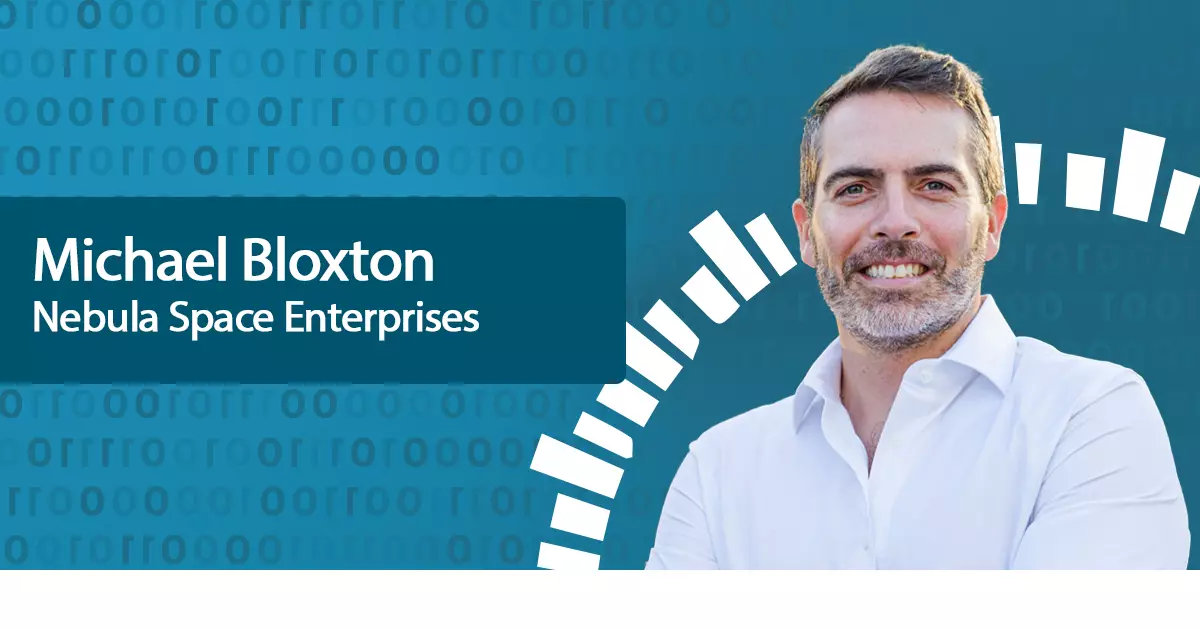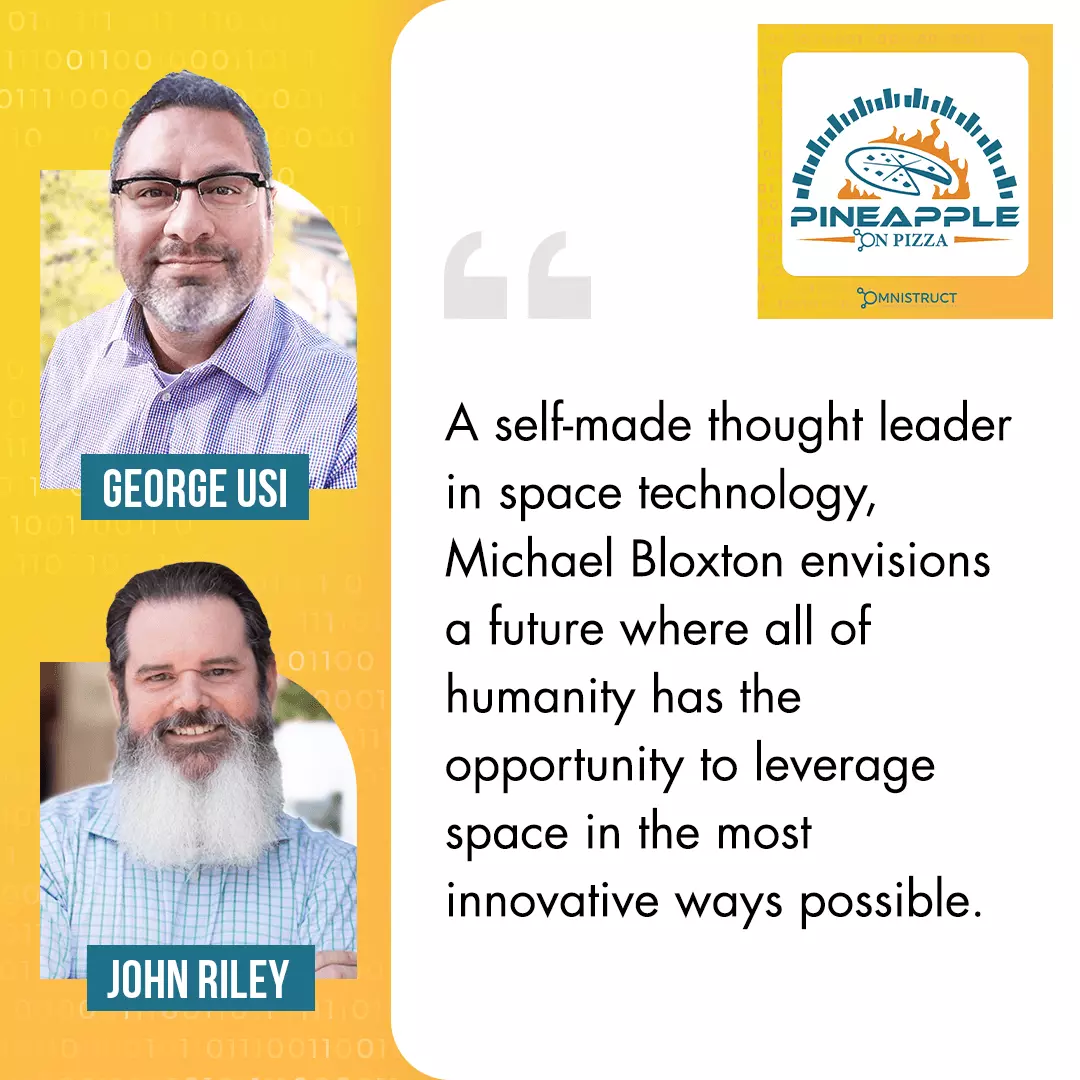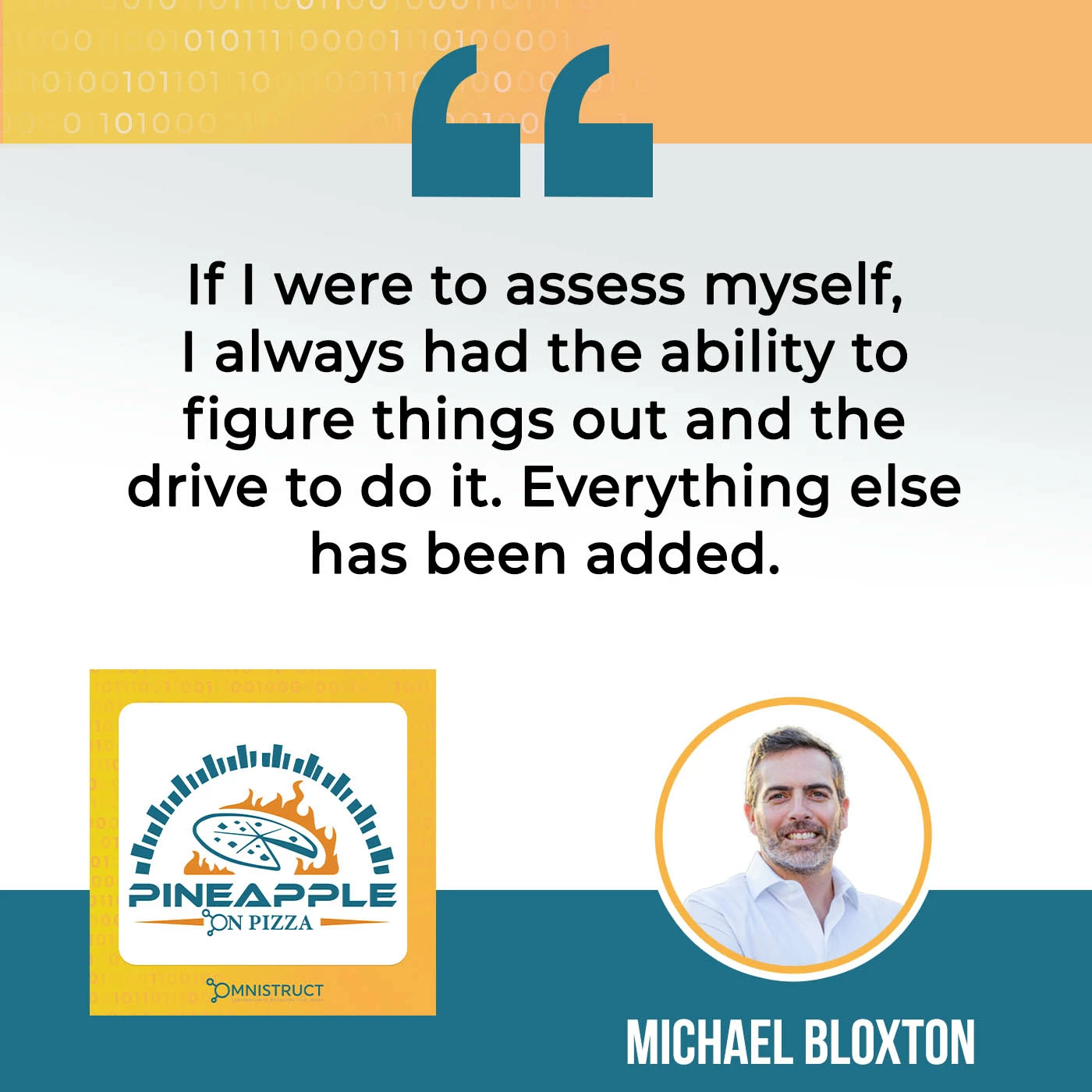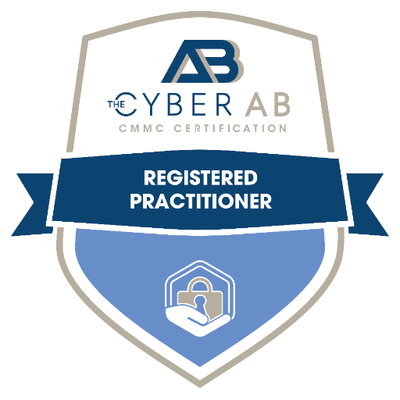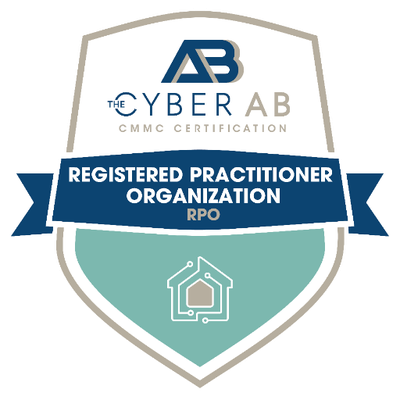We may not hear much about it, but the space economy is huge. And given the trajectory of its growth in the past few years, it is expected to grow exponentially bigger in the near future. This is what keeps Michael Bloxton up at night. At Nebula Space Enterprises, Michael is busy coming up with innovative solutions to space problems, including issues in space cybersecurity. He joins in the show in this episode to walk us through some of the things they’re working at and what he sees beyond the horizon of this rapidly expanding universe. He also shares a bit of his journey into space tech and what kindled his passion for all things space. They say the sky is the limit, but we’re clearly going even beyond the sky for this one. Tune in and get a glimpse of what this future looks like.
—
Watch the episode here
Listen to the podcast here
Tackling Problems In Space Cybersecurity And Shaping The Space Economy Of The Future With Michael Bloxton, Nebula Space Enterprises
In this episode, we’ve got Mike with us. He was a caddie for Pebble Beach and Mike is now CEO and Founder of Nebula Space Enterprise. Welcome, Mike. Thanks for coming and joining us here on the show.
Thanks for having me, John and George.
Mike, we got to start with our main topic, which is if cyber risk was a pizza and the frameworks were crust, what’s the riskiest topping you’ve seen and what would you equate that topping to?
S***. I hate to say that, but I’m going to come right out and say it. Cybersecurity is such a critical piece. It’s been critical for decades at this point, but it’s so critical now and I’m in space. You can’t do space without it. It’s so critical. There isn’t a future in which we have the space economy and technology if we don’t have cyber security. The worst thing that could happen is we don’t have it. I hope that answers your question, but that’s my personal opinion and how I feel about how important cyber is.
What topping would you equate that to? It sounds like you are equating it to cheese.
This is like you’re pouring anchovies. I don’t like anchovies. You’re pouring something terrible. The reason I used that particular word is my dad used to say, “S*** on a shingle.” That’ll be the topping I would choose.
Tell us. You are a Founder and CEO. In regards to that, what keeps you up at night? What are your struggles?
To me, the disposition that I have about being optimistic and happy is contrary to a lot of thoughts and things that keep me up at night. I have two very young kids. There is a non-zero probability that they could speak Mandarin when they’re older based on the trajectory on which we’re on. Again, this deeply involves cybersecurity, but also space, which is the domain I’m in. There’s a real risk here that most people have no idea and that keeps me up at night. How do we create awareness so that people take the deep fundamental action that’s required?
How do you see that working? What are those fundamental changes that you think need to happen?
Let me go to the fundamental changes, but I’ll answer that question you asked me with someone else’s opinion. I asked that same question to Eric Schmidt, the former CEO of Google and this was in a small group setting. He had no idea who I was. He didn’t know I was in space or anything. We were talking about longevity and all sorts of random things. When I asked him that question, do you know what his answer was?
We have zero defense for hypersonic missiles. That was his thought, which was interesting because I’m concerned about national security and freedom. His thought was we have no defense or even the ability to be aware of hypersonic missiles, which is to me the physical equivalent of what cyber is. There is almost a direct correlation. There are barely any good defenses for one size fits all for cyber.
The first thing is awareness. You need to be aware that something happens, which is good for humans. If I think about this from a cyber perspective, you need to not have to be aware at the same time. If you have space assets like we’re putting up, you can’t wait for a notification to come to the human. That’s already too late. Everything’s already done at that point. If you need to be notified and make a decision, that asset’s probably gone. When you think about it from that perspective, the solution has to involve the ability to innovate and think far beyond whatever it is that you could be anticipating, which is a difficult thing to do as a human.
If you look at what it was like in the ’70s for building an IP, the TCP/IP Stack, they thought that they’d never run out of IP addresses and here we are many years later, they got to come up with a whole new system with IPv6. It’s the same thing. Trying to figure out what those problems are for the future and build towards those, you got to expand your mind more so.
It is a very interesting point that doing anything and let’s call it what it is. It is non-terrestrial and extra-terrestrial in nature. It has all kinds of new problems from when you get an alert, the system’s already gone potentially. How do you predict when there’s a cyberattack happening? You can call it intuition if you want to, but ultimately, understanding exactly where your threats are in that environment can make the troubleshooting considerably difficult since you can’t fly up to do anything.
I agree wholeheartedly. The assets on the grounds present a vulnerability, man-in-the-middle type of attacks. That’s as far easier to physically get in between some communication device that’s along the chain or along the network. However, in space, you don’t even have the option necessarily to go and try and secure a man-in-the-middle attack to secure a facility. That’s not even on the table, which is good from a security perspective, but it also means you are 100% reliant on the digital communication chain, whether that’s RF, laser, or whatever.
To me, it’s more critical. Before we go down the sky is falling side of things, we are also presented with a good opportunity. John, you bring up the ’70s. As they’re building this thing, 100 computers are going to be on it. That’s what they thought. Only universities are ever going to use this thing. It’s only going to be bulletins, etc. but then HTML, HyperText Markup Language. When that came out, it changed the game and it got to be more humanized.
We’re at a point now where we can design it. We’re at the point where people think about all this amazing stuff that’s happening in space like Starlink, OneWeb, and Kuiper building all these big networks, but we’re still in such infancy. We have the option to be able to rewrite how we would have built the internet if we had the choice to do it. We can do it.
]]
You’re seeing a lot of that conversation happen, especially inside of the Department of Defense of what are the standards that we can build in. What’s the type of security? What’s the new NSA Type 1 certification that they can do for this level? Where is quantum encryption, and quantum key distribution coming in? How do they start baking this into every piece of it, not only this one sensor or that one sensor?
An organization that is focused on space technology. I imagine this is an everyday consideration for you in terms of the market and what it is that you’re trying to deliver to the end customers. Who exactly is your end customer in terms of the products that you’re offering now and what are the risks associated with those products?
When I think about it, it’s super sexy and cool to do space. Frankly, if you understand cyber, it’s super sexy and cool to do cyber too, because there’s nothing that it doesn’t touch. Space is similar and people are only becoming aware of how intimate that is a part of our life. It’s as ethereal as cyber because you can’t go and physically touch it yet. That’s not an option for most humans to be able to go and touch it. You can’t go and touch cyber.
You have that same similarity between cybersecurity and space technology. When you think about it from that perspective, the risks are very similar as we’re touching on. The customer, because of how space is developing, is primarily the Department of Defense. If you look at the space economy, it’s pretty much two markets. It’s telecoms and its earth observation. If you break earth observation down, it’s almost entirely governments.
You could have billion-dollar companies like Capella and ICEYE. Almost all of these different companies’ end customers are governments that are purchasing the vast majority or something like 80% of it. You have two markets and one market has almost one customer. To put it in comparison to where we’re at the knee of the curve here, in my background, we talk about cell towers. Ma Bell put up 5 million sticks of wood across the entire United States to connect the wire to wire up the entire United States. It took them 100-plus years to put 5 million poles.
In the ’80s, we had cell towers. We now have roughly 500,000 cell towers in the United States. I hear 5 million poles to 500,000 cell towers. That’s an order of magnitude less infrastructure and cyber starts to come into the conversation at that point. Now, when people hear about 50,000 satellites from Starlink or 50,000 satellites from Kuiper, they get all crazy but it’s not serving just the United States. This is serving the entire world. We’re watching how it’s unfolding in Ukraine right now.
You go 5 million, 500,000, to 50,000 and we’re at that knee of the curve where you’re capable of providing for a fraction of what infrastructure required before to be able to provide a capability to the entire world. When you think at that point, when those things start to scale, your customer becomes the entire world. Right now, though, primarily the customer is the government who’s trying to help create a capability for national defense and national security, and they’re the ones that have the deepest pockets. Even SpaceX has built off of many government contracts.
Tell us about your solution. What solution did you bring to the table for that?
If you think about the internet now, I’ll try and layer some cyber into this. Typically, I only say there are three things with the internet. There’s an endpoint, communication, and processing and/or response. That’s the entire internet. It’s an endpoint, the communication layer, and then the actual processing and/or response layer. Cyber needs to touch all those things. Cyber is protecting data at rest, data at movement, and data in action. That needs to be baked in.
What most people think about when they think about the internet is either their endpoints or the communication device, the fiber optic cable, or the cell tower. For us, in this case, it’s Starlink or the Kuiper. What most people don’t realize, and again, this goes in my background. The amount of computing capability required to communicate is insane. You’re seeing it even more difficult and this is where the man-in-the-middle attacks come in.
You’re getting your phone pinged six times a minute or six times a second or something ridiculous like that so they know where to route the call and that’s a massive computing issue. You have vulnerabilities there with the processing that you want to do with any data that’s moving across. In space, if you’re taking a picture that’s a huge image, for a 25-gigabyte image, you got to figure out how to communicate that down and then do something with it, because nobody, especially in defense, cares about the image.
They want to know that this is a tank. Here are the coordinates. Here’s where it’s going. Those three things are a text message but to get that in this day’s infrastructure, you need to bring that whole thing down very slowly. It’s not as bad as dial-up was, but it’s not 5G. It’s not broadband. What Nebula is doing is adding that computing node into space.
Taking something, a terrestrial grade, computing off the shelf, putting it into a Nebula box, and putting that into space is 100 to 1,000 times more capable than anything in space now. If you have a 25 gigabyte SAR, Synthetic Aperture Radar image and you’re taking those every 30 seconds, we can ingest them at high speed in space and do object detection and change detection against that and send the answer anywhere in the world within seconds. It means that you’re getting answers and intel saving lives. We’re talking seconds versus hours. Our solution is terrestrial-grade computing in space. Space data centers are a good way to think about it.
In the old carrier industry, we used to call it a point of presence. I’m not as familiar these days with some of the different networking technologies that are in use like SpaceX and some of those organizations but on the government side, I’ve got quite a bit more experience in those areas. The issue is always latency. The amount of time it takes to go from earth to let’s say you decided to put something on the moon compared to JPL’s trip to Mars and some of their research teams.
That’s an 8 to 15-minute delay. The internet doesn’t work well when you have an 8 to 15-minute delay so you have to store and forward the technology. I imagine in your situation because there are multiple markets, where’s this space technology going? Are you going to Mars or are you more focused on the monitoring side of the planet and giving outcomes?
There are 8 billion buyers on earth and I don’t know of any buyers on Mars. There are only a few if you count the rovers and orbiting things. There’s a need to accelerate what humans need and get those answers. Latency is such a big thing. Life or death happens on the front line within seconds and if you’re waiting 15 minutes to 90 minutes, which is about the average right now in some situations for intel, you could have completely bad intel.
The solution that we’re looking at is that we bid off a lot because we wanted to solve the problem. This goes back to our conversation about it’s hard for humans to think truly innovatively. We typically take something and make it a little bit better. That is a standard thing. You could be applying that to cyberspace, agriculture, computing technology, food, books, or whatever. We take something and make it a little bit better.
In order to solve the problem, we need to figure out how to do something significantly better 100 times or 1,000 times better. What Nebula is biting off is how you get these things to operate in free space because radiation and thermal are real. They are fighting against you every second that that processor is running. How do you get this to operate in free space? If you can do that, you can go anywhere. You could go to cislunar space, around the moon, on the moon, go to Mars, on Mars or you can go to asteroids. You have a capability that’s truly flexible.
I’m not going to lie when I say it’s a pain in the ass to figure this out, but we’ve been at this for years at this point. We’re sending our demo to the ISS this year to prove that we can do this in free space. It’s possible and you can create real solutions around it. That’s our decision to make and do the harder thing first because if you can do that, you can do it anywhere.
That’s a great explanation. Where you’re playing in that market makes sense.
It’s a very cool solution, by the way, even not only from a cybersecurity standpoint but from a future standpoint or futuristic standpoint. I look forward to seeing some of the changes that you’re creating. That’s awesome.
George goes back to the last question a little bit too. We could make this for people in space and you’d have a super small market, but imagine if Starlink and Kuiper are going up and then you start bringing the data centers up. You bring the internet up and then on that, because of the compute capability, the communications can be secured. We can add quantum key distribution across the entire network and every node on that network, even receivers on the ground.
You have the opportunity with this type of capability to rewrite what the internet should have been, especially from a security perspective. You need the hardware, which is the hardest part. I joke and say that it’s as if I drew a Venn diagram of the hardest things you could do as a startup company, space tech, hardware, and then try and figure out the investors that want to do those two things, deep tech, very few. We thank our investors for backing us but that was a tough thing to do.
The reason we did it is that if we can solve that problem, you create a capability for humanity, the other 4 billion people that aren’t actively engaged in the internet that they’re going to be able to do things with that in a more secure way and safer anywhere in the world. That is going to accelerate all. If we’ve been able to do what we’ve been able to do with the developed countries on the internet primarily, imagine when you double the number of people that are adding to that economy and in a secure way.
Find those diamonds that are maybe out there that are hidden right now as far as people and resources go.
Where’s the next Einstein going to come from?
Michael, what events do you go to learn more about this? It seems like such a forward-thinking thing. It’s not like there’s a space compute event that I’ve seen. How does somebody learn more about this?
For us, you can go to NebulaIncorporated.com. We’re actively building an event right now. I just sent the email out looking for the first people. When I started this, I don’t have any background so hopefully, this is inspiring to anyone reading. I have zero aerospace background. I was a caddie at some point for two years at Pebble Beach. One of my friends caddied for this guy that had a boutique finance company and happened to sell towers.
I became a VP of that company. They were backed by Goldman. I later founded a company. I was invited to find a company that was backed by Blackstone doing cell tower finance. Ultimately, I started my own real estate company where I was purchasing assets across the US, commercial assets that had cell towers. Nothing you heard there was aerospace and at some point in 2017, I had enough cash in time to think about what I wanted to do with the rest of my life.
My wife was pregnant and this is our first child. I was thinking about the world in a different way. When I looked at things I was willing to dedicate decades to, space was the thing. That was shocking to me because I have no background in space. I was like, “I want to do it.” It wasn’t until my son was born. When he was about a month old in the middle of 2018 where I was holding him and had a visceral experience. Why doesn’t he have the future he deserves?
I went down this rabbit hole and I had plenty of time at 1:00 AM trying to put this baby to sleep by doing these circles around my house thinking and trying to put him to sleep of what that future looks like. What does the future he deserves to look like? I believe it intimately involves access to space and being able to go to the moon or Mars. You figure out what’s required to do that. You’ve already heard me talk about computing hardware as an accelerator to every industry but then baking in cybersecurity, blockchain technologies, and these things that will make it more robust and secure for him to be able to live that future.
Now, I am surrounded by world-class people. I am still shocked that some of our advisors listen to me all these years ago. These are smart people, a chief scientist at the ISS National Lab, a chief scientist of a publicly-traded space company, a three-star general, a former Chief Futurist of the Air Force, and astronauts. I can’t believe these people listen to me but I had a dream and a vision that I shared with them and they supported me.
Now, here we are with multiple companies attacking this effort in what I call the first phase of this. Where do you go for an event? If you’re someone that has no idea about space, that’s what we’re creating now. We have SpaceLeadersSummit.com which is not meant for everybody. It’s only US citizens at a super small event that we’re putting on. It’s meant for people that were in the same place where I was. You’re coming out of something, you’ve had some success, you’re looking to dive into space, and you wanted a shortcut on-ramp.
You don’t want to do what I did, which was the other answer. You go to any event that you can find that’s space. You ask a ton of questions. You look bad most of the time because you’re asking very basic dumb questions because you don’t know anything. You watch a lot of YouTube videos and you read a lot of books. I was even cold-calling people. I was like, “You’re an engineer at this company. Can you tell me about how this works?”
I had to do all of that over years and I spent a lot of money traveling across the country going to all these events trying to get that network. I don’t think that’s effective or efficient. We can do it better and that’s why one of the other things if I didn’t have enough on my plate, is to try and find this or create this shortcut on-ramp for people. I am sorry for the long-winded answer there, John.
That’s fine. It shows the journey of where you’ve been. It’s inspiring to see that, to take the knowledge that you gained and apply it. We’ve all had that early morning with the kids and trying to figure out what you’re going to do and you have that a-ha moment. You remembered yours. Most of us go back to sleep and it goes into space.
What’s interesting as I reflect on this and I’m thinking about you guys and your position in cybersecurity. It’s those five years, and I’m aware of people that knew nothing about cybersecurity. They were software engineers or something relatively technical that knew nothing about cybersecurity and decided to dive in. They decided to go get that certification.
They are in such hot demand five years later that their life looks completely different because what you guys are doing and what you’re focused on is so critical to every industry that now, you don’t have enough people. I feel the same way about space. We don’t have enough people actively working on these space problems and I don’t think we have enough people actively working on the cyber problems either. I feel like we’re kindred spirits in that way.

Space Cybersecurity: We don’t have enough people actively working on space problems, and we don’t have enough people actively working on cyber problems either.
My next question is and you already touched on this, but what excites you about the future? You’ve got space. You’ve got a little bit of cybersecurity there. Space is pretty exciting, but what else excites you about the future?
It’s possible. The possibilities. If you look at the rate of change going from a computing perspective, you used to have bugs in the vacuum tubes because there was a bug in the vacuum tube and we still call them bugs now. There’s a bug in the software. We go from that up to now into silicon, transistors, and things like that. There’s always been the leveling off of one technology. There’s always been an innovation to bring us up. There are multiple S-curves and it happens quicker and quicker.
The other interesting part is the human’s ability to start thinking this way. There was some study around that I read where in World War II Middle America, it was nearly impossible for the average person walking down the street to imagine themselves in someone else’s shoes. They literally couldn’t do it. I’m going to paraphrase that crap out of this. If you said to them, “Imagine yourself walking down the street going to the store to buy this.” “Why am I going to the store? Why would I be walking down the street?” They couldn’t get themselves into it.
Whereas now, we’re capable of imagining things that are completely somewhat unrealistic but we can start putting ourselves in. Now, you see things like the manifestation of that, the metaverse as an example, or great science fiction that’s starting to become our reality. It was science fiction because it planted the seed of what could be possible and people figured out how to bridge those two gaps. I’m super excited about that because I don’t think it’s at all going to slow down. In fact, I would argue that right where we’re at, there is a need for an exponential curve where our ability to accomplish things is only increasing with an actual real stat rather than this theoretical ephemeral thing.
It was something like $500,000 to build a website in the ‘90s, $50,000 in the late ’90s, and it dropped precipitously to $5,000 in the early 2000 and $500 in 2010. It’s damn near free now to build a website. That is directly related to technology. We could go through use case after use case where the ability to do and create things is so thin that we’re going to see more and more things created. That’s what I’m excited about in the future. Anything’s possible.
Tell us a little bit more about yourself. Where did you come from? You’ve talked about being a caddie and your experience becoming a vice president at a company and doing the wireless installs for real estate. Tell us a little bit more about some of these things.
I grew up outside of Philly. I was a caddie. The company I worked for wouldn’t hire me. I sounded like I grew up where I grew up in Philly. They said to me, “Mike, we don’t want you representing our company.” That’s how I ultimately got started. I grew up outside of Philadelphia. I ended up knowing a friend that could golf and he caddied and I got a job. I didn’t know how to golf or anything either. That was another sad story for anyone I was caddying for. I’d never played golf before I started caddying at Pebble Beach, which is again sad for them. I worked on how to do this.
If I were to assess myself, I always had the ability to learn and figure it out and the drive to do it. Everything else has been added. Everything else, all the skills, whether it’s real estate, finance, or even the little bit that I know about cyber and space, all of that has been added to me. I feel like I’m a guy that’s trying to figure it out and make some things happen.
As long as you can continue to learn and expand your knowledge, whether it’s learning from a book, an event, or a person, that’s what keeps us going. That’s where the knowledge transfer. That’s what life is about, in my opinion. What other positions did you have and then where are you now? Where do you live?
I grew up outside of Philly and then some of my friends as an inside joke will say, “I wasn’t just smart because I left Philly. I was a genius because I landed in San Diego,” which a lot of friends call paradise. This is paradise in the US. There’s no reason to go anywhere else. There’s a financial reason to go a lot of other places than here but that’s where we’re at now and the journey has been immensely enjoyable.
I do agree with you that the transfer of knowledge is the thing. Life is about trying to pursue these things. My mind is wired and someone’s like, “Are you on speed all the time? Do you take drugs constantly?” I think through these things and somehow process and connect converging pieces. I’m capable of understanding enough about cyber to be able to understand how it fits into space and how we need to be pulling it together. I’ll quote Einstein. Einstein said, “If I’ve ever been able to solve a problem that someone else has, it’s because I spent more time on the problem.”
He has another quote that I love. “If I had 1 hour to solve a problem, I’d spend 55 minutes thinking of the right question to ask,” I remember not knowing any of these things and I’d hear something like that. I’m like, “I don’t know how to solve this problem so let me think about the question.” We’ve all heard leaders or readers. I hated reading, but that’s what leaders did and I wanted to be a leader. I was like, “I got to read.” Those little things have helped me ultimately become who I am, where I am, and live this wonderful life that I live.
Let me ask you this, Michael. If you could go back in time and give yourself some advice, what would that be?
I’d look for better tools. I’m trying to think of how would I shortcut it and all the experiences even the tough ones. Even the ones I wish I didn’t have made me who I am. I don’t want to remove any of those things because I would be less of myself at that point. I feel like I could continue to become a precipice of my experiences.
If I were to go back, I wish I could give myself a download. If I could click a download of information. Again, this is why I’m passionate about this event that we’re holding because I wish in I could give somebody what took me years to get in two days. If I could give that to myself, that would mean I’m four years ahead of where I am now. In other experiences, I don’t know if that was even a possibility because I would go to events like that. I would show up at an event for real estate or finance and I would get a good download that would help. How do you compress that capability?
One thing that someone told me if I were to share, but I got it at eighteen, so again, I was blessed. He said, “If you have nothing at all but you have integrity, you have everything.” I had nothing at all. I was like, “I’m all in on this. I don’t care what you’re about to say. I’m going to listen to it.” It took me years to figure out what he meant by integrity. That has been a gem to me. I did get that fortunately at eighteen. Maybe I would go back earlier and give myself that because that has been formative to who I’ve become.
We’ve all had those mentors that said something that changed us and I can understand that.
Maybe tell myself to get in the space quicker but again, I don’t know if space was ready. You guys are in cyberspace. Maybe there is a few years difference at this point, but you couldn’t get to space cheaper. Because of SpaceX’s reusable rockets and because of things like Starlink, that space is now primed for someone like a startup to be able to get there. That’s only a few years ago when that was even a possibility.
In 2020, there was a company SpaceIL out of Israel, that fraction landed, but they landed on the moon for $100,000 total, which has never been done since the ’60s, which cost $200 billion to $100 million. Yes, it was 60 years, but that is an insane trajectory. That was only possible because of what happened in the last decade.
With all the space and with everything else, meeting with everybody, the flying, and everything, what do you do outside of work, or is there anything outside of work because it sounds like this is already your passion?
I am so fortunate, it’s my passion and as you heard, part of the story that got me into this was my kids, my 1st son, and now propelling with my 2nd. I love this life. That’s also why people think I can accomplish so much. There is so much because I spend every waking hour thinking about these things. Even when I’m playing with my kids, I’m thinking about this stuff. I get the spiritual recharge when I’m with my family, but I’m still thinking and processing all the information I received that day or problems that we’re working on. I do truly sit with the problem longer.
Is there anything specific outside of it that you do that you enjoy?
I’m playing basketball because I hate to run on a treadmill. I play basketball a lot to get some exercise in and try and stay fit. Balance is an illusion, but trying to keep things not completely out of whack. I got to balance some of this out with physical. You guys know what happens when you get COVID and you’re out for the counts. There’s another good saying. “A man with health, 1 million desires. A man that is unhealthy has one.”
Mike, where can people find you?
You can find me on LinkedIn. I’m Michael Bloxton on LinkedIn. You can find us on NebulaIncubator.com. I said Nebula Incubator, which is another company we have that we’re just starting. Nebula Incorporated is Nebula Space Enterprise, where you can then find all the other companies including incubator and then MichaelBloxton.com is where you can also find me.
Are you also on Twitter?
I am on Twitter and I do some of those things. I don’t find productive engagement. I can get people’s opinions on Twitter, which is useful at times but productive engagement I find happens more on LinkedIn.
I understand you also have your own podcast, is that correct?
We do. It’s Your Place in Space. Just like guys, you need more people doing cyber and you heard about me doing these events. Your Place in Space is our podcast where we are actively working to help anyone in the world, fashion designer, plumber, electrician, barista, or whatever it is. How do you find your place in space? Nebula Media is driving that and we want more people there. Your Place in Space is where we get to have people connect to, “Holy s***. I can do that,” kind of thing.
Michael, we appreciate your time on this. It’s been wonderful having you, learning more about space, and figuring out how that will work with cybersecurity. To our audience, we’d like to thank you for reading. Hopefully, you’ve learned something or laughed. If you have, please tell someone about this show. This has been another great episode. See you next time.
Important Links
- Nebula Space Enterprise
- SpaceLeadersSummit.com
- Michael Bloxton – LinkedIn
- NebulaIncubator.com
- MichaelBloxton.com
- Twitter – Michael Bloxton
- Your Place in Space
- Nebula Media
- https://NebulaCompute.com/
About Michael Bloxton

Building the Infrastructure Humanity Needs by Leveraging Space
Space Fanatic
Real Estate Investor
Michael’s passion is in exponential technologies and, in particular, creating opportunities based on the converging exponential technologies such as growth in Artificial Intelligence, Machine Learning, Robotics, Sensors, and Biotechnology to name a few.
With a small team, Michael is identifying missed opportunities and opportunities on the horizon by tracking the convergence of how these technologies merge and amplify their benefit to each other and to humanity.

